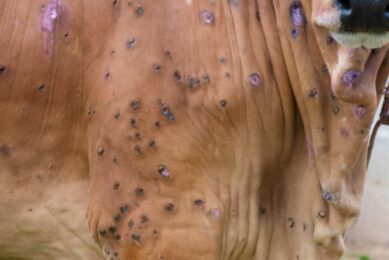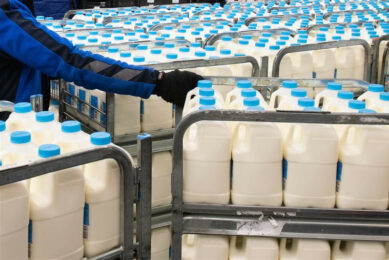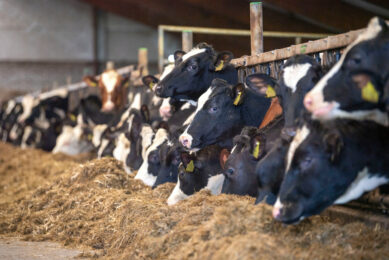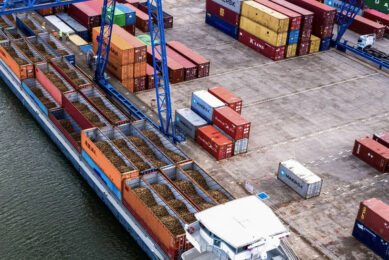World is not ready for extra milk
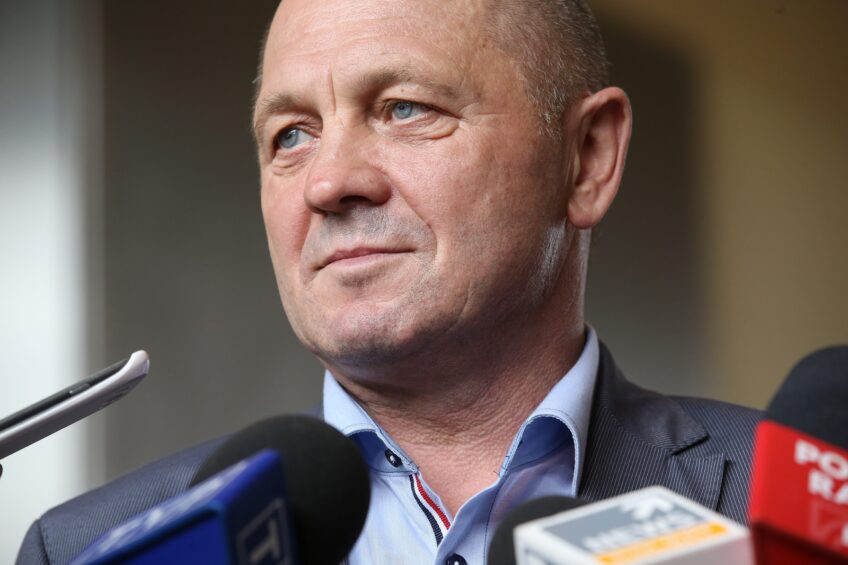
Polish farmers exceeded their milk quota by 7% in the first year after accession to the European Union. Now, ten years later, they are heading in the same ?direction again. The European quota system to limit milk production, according to Agriculture Minister Marek Sawicki, did not hinder the development of Polish dairy. In fact, according to the Minister, Poland has one of the most modern dairy sectors in the world.
Before Poland joined the European Union, there were serious doubts whether the Polish dairy sector could compete with Western companies on the domestic market. Now it appears the Polish dairy sector is successful not only domestically but also in the European market. Is the Polish dairy sector a flourishing business?
“Today we can see that the Polish dairy sector is able to compete with the most modern dairy sectors in the world. The doubts mentioned were actually not related to the dairy sector specifically. The entire Polish agricultural sector had doubts about the impact of EU accession. Farmers were sceptical and thought they were unable to compete with foreign producers.
The number of dairy companies in Poland in the last decade has fallen from more than 500, mainly small cooperatives, to less than 200. The ten largest dairy companies now account for 90% of total milk collection. The number of dairy farms has declined from over 700,000 to less than 200,000 accounting for about 12 million tonnes of milk.”
The milk quota of 7.5 million tonnes allocated by the Commission in 2004, did this not cause frustration in the development of the Polish dairy sector?
“There was a lot of protest. Dairy farmers were afraid that the quota would block the development of their business. However the introduction of the milk quota definitely did not stop the development of the dairy sector. The sector is thoroughly modernised and has now better access to the European and world market. Before 2004 Poland was a net importer of milk. Now 30% of our milk and dairy products are intended for export. Dairy is now one of our main agricultural export products.”
Poland has always advocated for the preservation of milk quotas. Nevertheless the quota system will disappear next year. What are the consequences for the Polish dairy sector?
“Only Poland and Portugal have lobbied for the preservation of milk quotas until at least 2020. This was not without reason. The world is not ready for the extra milk supply that comes after the quota disappears. In addition, Europe is not ready to sell its dairy products to countries outside of the EU. Our only hope is consumers in countries like China and India will eat more cheese, and in this way would let our surplus stock disappear.”
“On the other hand the abolition of milk quotas offers the Polish dairy sector new opportunities for development. If we manage to avoid a new crisis, I expect no serious decline in milk prices. Milk production in Poland will increase in the short term by 30%. In my view Poland and Germany are the two countries in particular where growth in milk production will take place. We have a good climate, good soil and access to plenty of animal feed.”

Can the Polish government still do something when it goes wrong?
“Given the scale of production and growth of the sector, I do not think that the Polish government can do anything on its own. In fact, I do not think Europe as a whole is ready for a serious economic crisis. Actually this doesn’t apply just to the dairy market.”
Will Brussels come up with a solution?
“Does Brussels have a serious response to the Russian boycott of agricultural products? Take the dairy crisis in 2009 for example. The European Commission only reacted after a year and then it was too late for any serious action. We have a good administrative system in Brussels, many committees, working groups and consultants. The only thing missing are people who dare to take serious decisions. Perhaps this will come eventually.”
Polish farmers exceeded their milk quota by 1.7% last year. So far the Polish milk supply lies 7% above quota. Should the super levy from the last milk year be waivered?
“The European Member States together will not exceed the European milk quota. That’s why it doesn’t make sense to pay super levy anymore. In some countries production will increase, in other countries production will decrease. For example: Bulgaria will only use 55% of its quota. In countries like Germany, Denmark and Poland you see production rise substantially. Unfortunately, as farmers in Europe we prefer to wish each other misfortune rather than opportunities for development. That’s why a proposal by Poland, Spain, Germany and other milk producing countries was not accepted. For the current year, I do not think paying levy can be prevented.”
The dairy market is growing, but the gain seems to be mainly in the production of value-added products. Can the Polish dairy sector compete on the world market?
“The Polish dairy industry has several competitive advantages. For example, low labour costs and low-priced feed. In milk processing a considerable consolidation still has to take place. The same applies to trade. If we are able to organise the dairy chain properly, and by that I mean production, processing and trade, we can benefit from these competitive advantages for at least the next 20 years.”
Has the abolition of quotas come too soon?
“In my opinion Poland is ready for the free market. As for quality, I think Polish hard cheeses are not inferior to the Dutch hard cheeses. Last year, several Polish and French dairy products were compared in Algeria. The outcome was that the Polish and French products could, regarding quality, compete with each other. But the difference was that Polish products were 20% cheaper.”
Then you are doing something incorrectly. Why don’t you ask for the same price?
“Exactly, further consolidation and cooperation should change this. As a matter of fact it would also be interesting if the French lower their price to Poland’s level. But then the French dairy farmers are likely to go bankrupt. Maybe it’s a nice way to get rid of competitors.”

Should Poland, given the mentioned competitive advantages, not be the last country to worry about the abolition of the quota system within Europe?
“Poland has a lot of potential for further expansion of its milk production. There are more and more companies that have between 50 and 150 dairy cows, in my opinion, from an economic perspective an optimum size. In combination with rising global demand for food this gives me much hope. But let me explain this one more time. Because Europe is not prepared to act in times of crisis, we do have reason for concern.”
In the last ten years more than €1 billion has been invested in the Polish dairy sector through agricultural and rural development programmes. Is this likely to continue for the next five years?
“I think that there has been even more money invested. From this amount, half of it came from Brussels. In addition to this, both the Polish government and the dairy sector contributed 25% of the total amount. This will not continue on this scale, however. Within the new rural development policy we want to focus more on the small and medium sized farms.”
Poland has more than 134,500 commercial dairy farms. How many of these companies will still be around in 2020?
“This number will not decrease much further. I expect that the number of cows per farm will increase. Remember that we still had 700,000 dairy farmers ten years ago. Under the new CAP from the 1st January we‘d like to grant a subsidy for the first 30 cows on each farm. The subsidy of €70 per cow applies to companies with at least three dairy cows.”
There seems to be severe tensions between the large and small dairy farms in Poland. For example, in the purchase of land, voting rights within the cooperative and also the distribution of subsidies.
“These tensions can be found in every European country. Europe did not really reform the new CAP despite the fact that in 2008 we stated clear goals. The fight for money and the distribution of available subsidies proved ultimately to be more important than achieving goals.
With the system of direct payments (the first pillar), everything remains the same. More money to the second pillar, rural development, would really change the agriculture sector. It would be a huge boost for the sector, but for now, neither France, Germany, nor the Netherlands, will let this big change happen. They prefer political peace.
It is true that small farmers refuse to sell their land, simply because they then will miss their payment per hectare. Actually, direct payments (first pillar) should not exceed 20-30% of the agricultural funds distributed. The rest of the funds should be used for the second pillar, for rural development. Farmers know themselves where investments are needed. Moreover, if they have to contribute 30, 50 or sometimes 70% of the investment, they will look closer to the returns on the investment.”
Why does the Polish government spend agricultural funds on companies with only a few cows?
“We must take into account the structure of Polish agriculture, where 50% of the farmers do not own more than five acres of land. I can’t support only 10% of the Polish dairy farmers and leave the rest to the Social Services. In my opinion also dairy farms with just three, five or 15 cows can produce dairy products to earn money.”
Can these companies still become successful commercial companies?
“That is the goal, but we need time to fulfil this. Luckily I’m still young and I have a lots of time.”
Marek Sawicki
Agriculture Minister Marek Sawicki (56), member of Peasant Party PSL, succeeded Stanislaw Kalemba in early March, 2014. His fellow party member was forced to resign because of criticism on his approach to African Swine fever. Sawicki was Minister of Agriculture from November 2007 to July 2012. For years he was a dairy farmer himself. When he retired in 1998, he had 16 cows and was the largest dairy farmer in the village.
Join 13,000+ subscribers
Subscribe to our newsletter to stay updated about all the need-to-know content in the dairy sector, two times a week.



